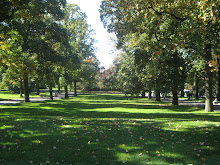
It seems that institutions and many organized groups would rather not see the Central Corridor Line get built in the Twin Cities. This would be our second LRT line that would connect downtown Minneapolis with downtown St. Paul. It would enhance and replace bus service and bring much needed public transportation to the cities.
Instead of embracing this, the university of Minnesota, MPR, and local community groups have decided to challenge the project based on the environmental review and mitigation. Honestly, the only group that has any ground to stand on are the community groups worried about gentrification and displacement. But they are also taking the wrong approach.
What they should be doing is fighting the good fight and organizing to get, and maximize, the future benefits. C'mon, this is really a once in a lifetime opportunity. They have chosen the hard road and are opposing the new line instead of trying to get the met council to make the needed changes they desire to the project. Another hurdle that threatens to derail the new line.
It is interesting that such a long term project and asset, which will benefit the region, can get bogged down in the local politics. Steve Berg over at Minn Post has some good insight into the entire situation:
The U dispute is only one of several that have placed Bell and the Central Line project in a bureaucratic vise. Various parties are taking bites out of the budget while time runs short on keeping the project viable for federal funding. The Federal Transit Administration has made it clear that lawsuits and other complaints, if left unresolved, would push the project off the front burner. Failure to get the Central Line into President Obama's budget next year could jeopardize the start of construction next summer and push its opening to 2015 or later.
More troubling, perhaps, are the unresolved civil rights complaints from two St. Paul community groups, the Concerned Asian Business Owners and the Preserve and Benefit Historic Rondo Committee. The groups expect the Central Line to cause disproportionate damage to minority communities, and they want compensation. They accuse the Met Council of failing to address the issue in its environmental review of the project, as required by federal civil rights law.
While the Met Council should be more engaging with this process with all parties, it seems that right now we are bogged down in what can I get now, instead of what benefits will I receive later.




No comments:
Post a Comment